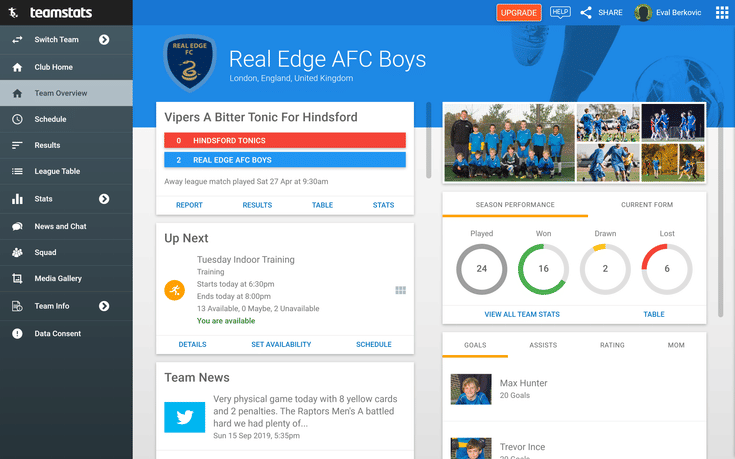Breaking into football coaching can seem daunting, but it's an accessible path for those passionate about the beautiful game. Many successful coaches begin their journey by volunteering at local clubs, where they gain valuable hands-on experience while building their network. To become a football coach in the UK, you'll need to pursue relevant qualifications through the FA coaching pathway, starting with the Introduction to Coaching Football course and progressing through UEFA licence levels.
The journey into coaching often begins with practical involvement rather than formal education. Sending emails to local clubs expressing your interest to get involved, volunteering with youth teams, or assisting established coaches can provide crucial experience. These opportunities allow aspiring coaches to develop their communication skills and tactical understanding while demonstrating their commitment to the sport.
Beyond practical experience, academic qualifications in sports science, performance analysis or coaching can strengthen your credentials. Many universities now offer dedicated football coaching degrees that combine theoretical knowledge with practical application. While Americans might call it soccer, the principles of effective coaching remain universal—focusing on player development, tactical awareness, and creating positive learning environments for participants at all levels.
Pathways to Becoming a Football Coach
Breaking into football coaching requires dedication, knowledge, and a strategic approach. Several structured pathways can help aspiring coaches develop the necessary skills and credentials to succeed in this competitive pitch.
Educational Requirements
A strong educational foundation can significantly enhance coaching prospects. Many professional coaches possess a bachelor's degree in physical education, sports science, or kinesiology. These programmes provide crucial knowledge about human movement, training principles, and athletic development.
UK universities offer specialised football coaching degrees that combine theoretical knowledge with practical application. Courses typically cover training methodology, match analysis, and player development frameworks.
Some coaches supplement their education with sports medicine or sports psychology qualifications. These additional credentials help coaches better understand injury prevention and management of player mentality.
Even without formal higher education, numerous coaching courses offered by county FAs provide valuable theoretical knowledge. These shorter programmes can serve as stepping stones for those unable to commit to full university degrees.
Gaining Practical Experience
Practical experience forms the cornerstone of coaching development. Volunteer opportunities with local youth teams offer an excellent starting point for gaining hands-on experience.
Working as an assistant coach allows newcomers to learn from experienced mentors. This apprenticeship approach helps develop session planning skills and tactical understanding.
Many successful coaches begin their journey by coaching youth teams or school programmes. This experience builds communication skills essential for working with players of all abilities.
Networking at coaching clinics and football events creates valuable connections. These relationships can lead to job opportunities and mentorship from established professionals.
Coaching within grassroots football clubs provides real-world experience managing teams, planning sessions, and developing players. This experience is invaluable when applying for more advanced positions.
Acquiring Licensure and Certifications
The Football Association (FA) provides a structured certification pathway for aspiring coaches. The entry-level FA Level 1 qualification introduces fundamental coaching principles.
Progressive certifications (Levels 2-5) build increasingly sophisticated coaching competencies. These qualifications are recognised throughout the UK and are often requirements for professional positions.
Key FA Coaching Qualifications:
- FA Level 1 (Introduction to Coaching)
- FA Level 2 (Certificate in Coaching Football)
- UEFA B Licence (FA Level 3)
- UEFA A Licence (FA Level 4)
- UEFA Pro Licence (FA Level 5)
Specialist certifications in goalkeeper coaching, futsal, or disability football can enhance employability. These niche qualifications demonstrate versatility and specialised knowledge.
Continuous professional development through workshops and refresher courses keeps coaching knowledge current. The football landscape continually evolves, making ongoing education essential for long-term success.
Essential Skills for Football Coaching
Success in football coaching requires a diverse skill set that extends far beyond understanding the rules of the game. Aspiring coaches must develop expertise in leadership, physiological knowledge, and strategic thinking to effectively guide their teams to improvement.
Developing Interpersonal and Leadership Skills
Effective communication forms the backbone of successful coaching. Coaches must articulate tactics clearly while adapting their communication style to different player personalities. This might mean being firm with some players while using encouragement with others.
Building trust is crucial for team cohesion. Players need to believe in their coach's expertise and commitment to their development. This trust develops through consistency, honesty, and demonstrating genuine care for each player's wellbeing.
Motivational abilities separate good coaches from great ones. Understanding what drives different players—whether it's competition, personal improvement, or team success—allows coaches to inspire peak performance during training and matches.
Conflict resolution skills help maintain team harmony. Disagreements between players or with officials are inevitable, and coaches must address these situations promptly and fairly.
Understanding Physiology and Sports Medicine
Knowledge of proper training principles helps prevent injuries and optimise performance. Coaches should understand how different training loads affect players and how to structure sessions appropriately for various ages and fitness levels.
Basic sports medicine awareness enables coaches to recognise potential injuries and respond appropriately. This includes knowing when to refer players to medical professionals and how to support rehabilitation processes.
Nutrition and hydration significantly impact performance. Coaches should provide basic guidance on proper fuelling strategies for training and match days, particularly for youth players who may lack this knowledge.
Understanding growth and development patterns is vital when coaching young players. Training methods must be adapted to physical maturation stages to prevent overuse injuries and ensure long-term athletic development.
Enhancing Decision-Making Abilities
Tactical knowledge forms the foundation of effective coaching. This includes understanding different formations, playing styles, and how to adapt strategies based on opponents and match situations.
Match analysis skills allow coaches to identify patterns and make adjustments. Modern coaching increasingly relies on video analysis and statistical data to inform decisions about training focus and tactical approaches.
Problem-solving during high-pressure situations requires rapid decision-making. Coaches must think clearly when making substitutions, tactical changes, or responding to unexpected developments during matches.
Resourcefulness helps coaches maximise available facilities and equipment. Many grassroots football environments have limited resources, so creative solutions for effective training are essential. In the soccer world, this might mean designing complex training drills using minimal equipment.
Continuous learning separates progressive coaches from those who stagnate. The game constantly evolves, requiring coaches to stay current with new training methodologies, tactical innovations, and sports science developments.
Securing a Coaching Position
Obtaining a football coaching position requires persistence, networking and continual skill development. The path typically begins at grassroots levels before potentially advancing to more competitive environments.
Exploring School Coaching Opportunities
The most accessible entry point into football coaching is often at the school level. Begin by contacting local schools through their websites to find head coaches' email addresses. A direct approach expressing your interest to volunteer can open doors. Many successful coaches started by assisting with training sessions or managing youth teams without compensation.
School coaching roles frequently become available at the start of academic terms. Building relationships with existing coaches and school administrators improves your chances of being notified when positions open up.
Gaining relevant qualifications through the FA coaching pathway demonstrates your commitment and enhances credibility. Even basic coaching badges can distinguish you from other candidates when opportunities arise.
Advancing to Professional Football Coaching
The journey to professional coaching typically requires several years of experience and proven success at lower levels. Networking becomes crucial at this stage. Attend coaching workshops, conferences and matches where you can connect with established professionals.
Key progression steps:
- Build a strong CV highlighting team achievements and player development successes
- Pursue advanced coaching licences (UEFA B, A, or Pro)
- Consider specialised roles (goalkeeper coach, fitness specialist, tactical analyst)
- Look for opportunities with academy systems where many professional coaches begin
Professional clubs often seek coaches who bring unique perspectives or specialised knowledge. Developing expertise in areas like performance analysis or youth development can make you more attractive to hiring managers.
Evaluating Salary and Job Outlook
Football coaching salaries vary dramatically based on level, location and responsibility. School coaches might earn £15-30 per session, while established professional coaches can command significant salaries plus performance bonuses.
The job outlook remains competitive but positive. The continued growth of women's football and expansion of academy systems has created new opportunities. Many clubs now employ larger coaching staffs than previously.
Typical salary ranges:
| Level | Approximate Annual Salary |
|---|---|
| Grassroots | £2,000-£8,000 (part-time) |
| Semi-professional | £15,000-£30,000 |
| Professional academy | £25,000-£60,000 |
| Professional first team | £50,000-£250,000+ |
Job security can be challenging, particularly in professional environments where results often determine tenure. Many coaches supplement their income through soccer camps, private training sessions or consultancy work while building their careers.
Professional Development and Growth
Continuous learning and strategic networking are essential components for any aspiring football coach seeking to build a sustainable career. Professional development enhances coaching capabilities while networking opens doors to valuable opportunities within the football community.
Continuing Education and Training
Football coaching requires ongoing education to stay current with evolving tactics and training methodologies. The FA offers various coaching certificates, from Level 1 for beginners to UEFA A and Pro Licences for those pursuing professional careers. These qualifications provide structured learning in technical skills, tactical awareness, and player management.
First aid certification is mandatory for all coaches. The Emergency First Aid in Football (EFAiF) qualification ensures coaches can respond appropriately to injuries on the pitch.
Many universities, including renowned institutions like OSU (Open Sports University), offer specialised coaching courses that combine theoretical knowledge with practical application. These programmes often include modules on sports psychology, biomechanics and nutrition.
Online resources such as webinars, coaching forums and match analysis tools provide accessible learning options for coaches with limited time or resources. The Professional Development Series, similar to those available in other regions like the soccer programmes in North America, offers regular lectures and workshops.
Networking and Career Advancement
Building a professional network is crucial for career progression in football coaching. Attending coaching conferences, workshops and training events provides opportunities to meet established coaches and potential employers.
Joining local coaching associations creates access to mentorship programmes and job announcements. These organisations often host regular meetings where coaches can exchange ideas and experiences.
Volunteering at local clubs or academies is an excellent way to gain experience while expanding professional connections. Many successful coaches began their careers offering their services without payment.
Social media platforms and coaching forums enable coaches to connect with peers globally. Following influential coaches and participating in online discussions demonstrates engagement with the wider football community.
Creating a coaching portfolio that documents qualifications, experience and coaching philosophy helps when applying for positions. Include match reports, training session plans and testimonials from players or club officials.
Show less












